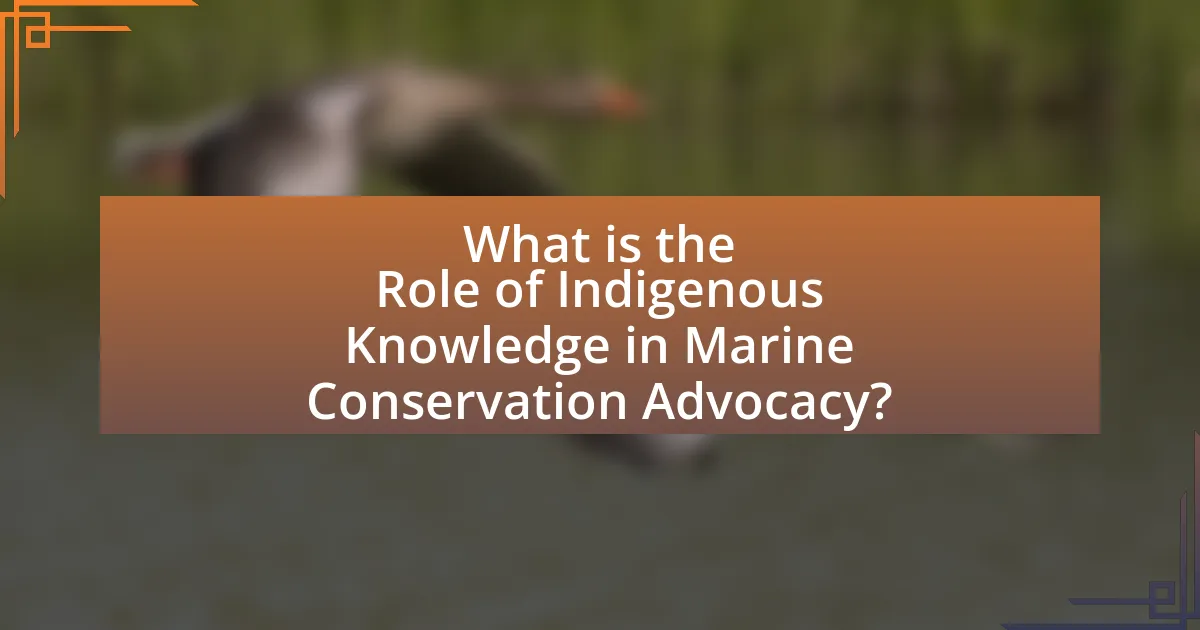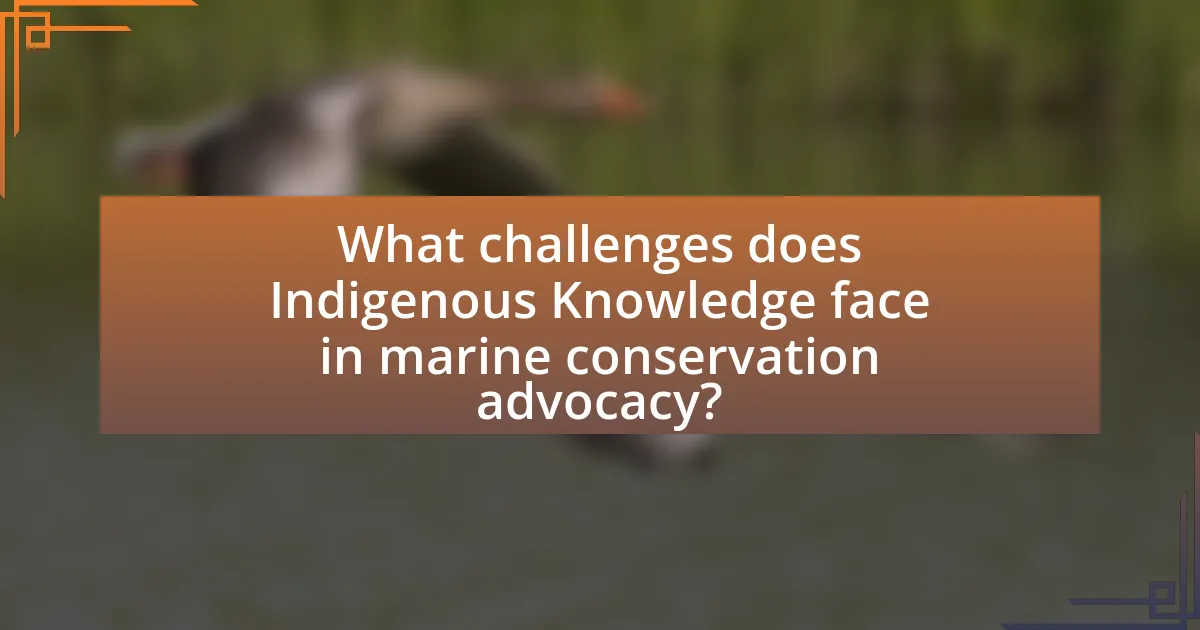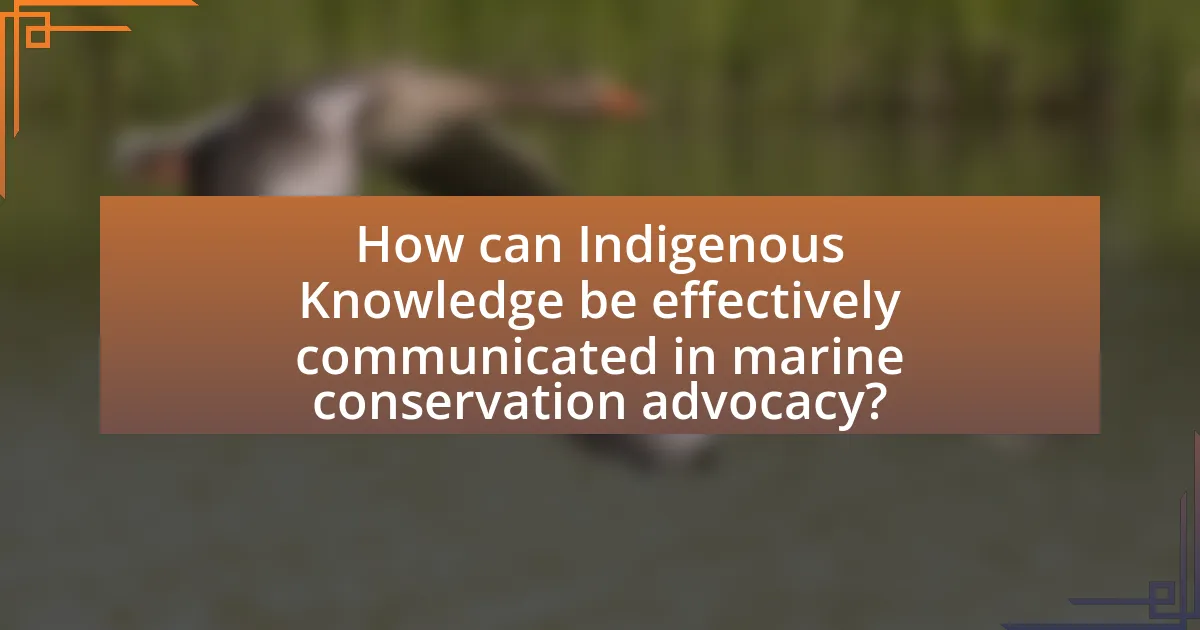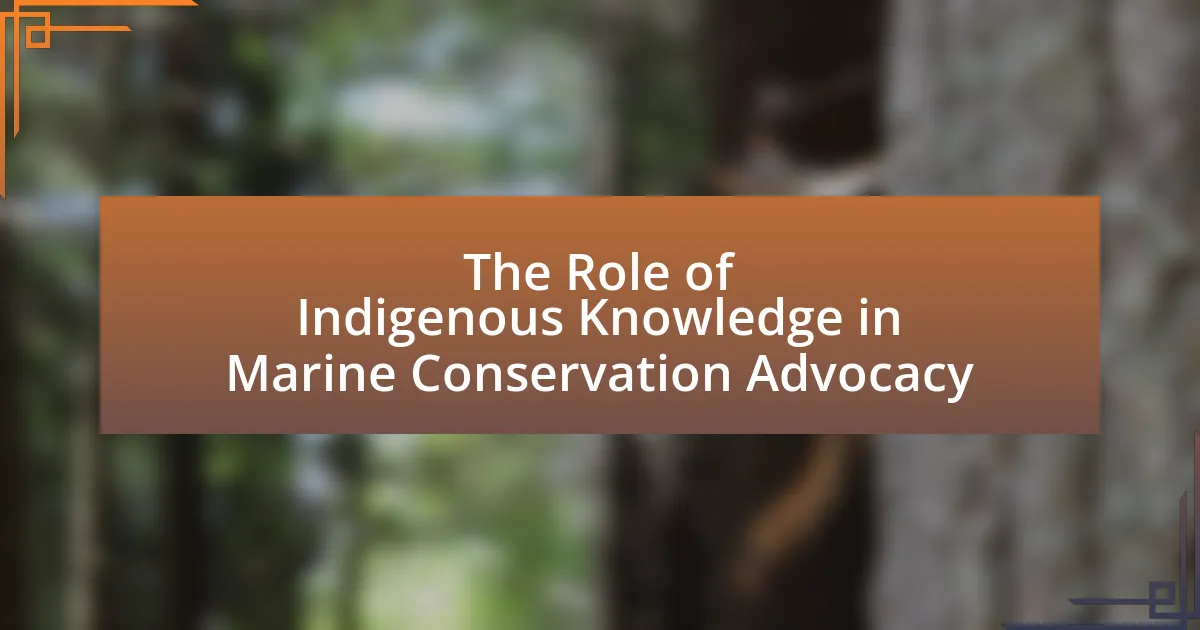The article examines the critical role of Indigenous Knowledge in marine conservation advocacy, highlighting its unique insights into sustainable practices and ecosystem management. It discusses how traditional ecological knowledge, accumulated over generations, informs effective conservation strategies that often outperform conventional methods. Key principles such as holistic understanding, sustainability, and intergenerational knowledge transfer are explored, along with the challenges faced by Indigenous Knowledge in formal conservation frameworks. The article emphasizes the importance of integrating Indigenous perspectives into marine policy and governance to enhance biodiversity conservation outcomes and community engagement in marine stewardship.

What is the Role of Indigenous Knowledge in Marine Conservation Advocacy?
Indigenous knowledge plays a crucial role in marine conservation advocacy by providing unique insights into sustainable practices and ecosystem management. This knowledge, accumulated over generations, includes traditional ecological knowledge that informs the understanding of local marine biodiversity, seasonal changes, and species behavior. For instance, studies have shown that Indigenous communities often employ sustainable fishing techniques that maintain fish populations and promote ecosystem health, which can be more effective than conventional methods. Furthermore, integrating Indigenous knowledge into marine policy and management frameworks has been recognized by organizations such as the United Nations as essential for achieving biodiversity conservation goals, as it fosters collaboration between Indigenous peoples and conservationists, leading to more effective and culturally relevant conservation strategies.
How does Indigenous Knowledge contribute to marine conservation efforts?
Indigenous Knowledge contributes to marine conservation efforts by integrating traditional ecological practices and cultural values that promote sustainable resource management. This knowledge encompasses centuries of observations and interactions with marine ecosystems, leading to effective conservation strategies tailored to local environments. For instance, Indigenous communities often employ practices such as seasonal fishing, which aligns with the natural breeding cycles of fish, thereby ensuring population sustainability. Research indicates that areas managed by Indigenous peoples often exhibit higher biodiversity and healthier ecosystems compared to those under conventional management, as highlighted in the study “Indigenous Peoples and Marine Conservation: A Global Perspective” published in the journal Marine Policy. This demonstrates that Indigenous Knowledge is not only valuable but essential for enhancing marine conservation outcomes.
What are the key principles of Indigenous Knowledge in relation to marine ecosystems?
The key principles of Indigenous Knowledge in relation to marine ecosystems include holistic understanding, sustainability, and intergenerational knowledge transfer. Holistic understanding emphasizes the interconnectedness of all elements within marine ecosystems, recognizing that human activities, marine life, and environmental health are interdependent. Sustainability focuses on the responsible use of marine resources, ensuring that practices do not deplete or harm ecosystems, as seen in traditional fishing methods that align with seasonal cycles. Intergenerational knowledge transfer involves passing down ecological wisdom and practices through generations, which has been documented in various Indigenous communities, such as the Haida Nation, where traditional ecological knowledge informs contemporary marine management strategies. These principles collectively contribute to effective marine conservation efforts by integrating cultural values with ecological practices.
How does Indigenous Knowledge differ from scientific approaches in marine conservation?
Indigenous Knowledge differs from scientific approaches in marine conservation primarily in its holistic and experiential nature, emphasizing long-term relationships with ecosystems. Indigenous Knowledge is rooted in cultural practices, oral traditions, and local observations accumulated over generations, which often leads to a deep understanding of local biodiversity and ecological dynamics. In contrast, scientific approaches typically rely on empirical data, controlled experiments, and quantitative analysis to inform conservation strategies. For instance, Indigenous communities may utilize traditional ecological knowledge to manage fisheries sustainably, while scientists might employ statistical models to predict fish populations. This distinction highlights the complementary roles both knowledge systems can play in effective marine conservation.
Why is Indigenous Knowledge important for marine conservation advocacy?
Indigenous Knowledge is crucial for marine conservation advocacy because it encompasses traditional ecological insights and sustainable practices developed over generations. This knowledge provides a deep understanding of local ecosystems, species behavior, and environmental changes, which can enhance conservation strategies. For instance, studies have shown that Indigenous-managed marine areas often exhibit higher biodiversity and resilience compared to non-Indigenous areas, as seen in the Great Barrier Reef where Indigenous practices contribute to effective management. By integrating Indigenous Knowledge with scientific approaches, marine conservation efforts can become more holistic and effective, addressing both ecological and cultural dimensions of marine stewardship.
What unique insights does Indigenous Knowledge provide for marine biodiversity?
Indigenous Knowledge provides unique insights into marine biodiversity by emphasizing the interconnectedness of ecosystems and the importance of traditional ecological practices. This knowledge, accumulated over generations, includes specific information about local species, their behaviors, and the seasonal changes that affect marine environments. For example, Indigenous communities often possess detailed understanding of fish migration patterns and breeding cycles, which can inform sustainable fishing practices and conservation efforts. Research has shown that integrating Indigenous Knowledge with scientific approaches can enhance biodiversity conservation strategies, as evidenced by case studies in Australia where traditional fire management practices have improved habitat conditions for various marine species.
How can Indigenous Knowledge enhance community engagement in marine conservation?
Indigenous Knowledge enhances community engagement in marine conservation by integrating traditional ecological practices and cultural values into conservation strategies. This knowledge fosters a sense of ownership and responsibility among community members, as it reflects their historical relationship with marine ecosystems. For instance, Indigenous communities often possess detailed understanding of local biodiversity and sustainable resource management, which can inform effective conservation practices. Research indicates that projects incorporating Indigenous Knowledge, such as the work by the Australian Institute of Marine Science, have led to improved conservation outcomes and increased community participation. This collaborative approach not only respects Indigenous rights but also strengthens the overall effectiveness of marine conservation efforts.

What challenges does Indigenous Knowledge face in marine conservation advocacy?
Indigenous Knowledge faces significant challenges in marine conservation advocacy, primarily due to systemic marginalization and lack of recognition. This knowledge is often undervalued in formal conservation frameworks, leading to exclusion from decision-making processes. For instance, many Indigenous communities possess traditional ecological knowledge that has been developed over generations, yet this expertise is frequently overlooked by governmental and non-governmental organizations focused on marine conservation. Additionally, legal and bureaucratic barriers hinder the integration of Indigenous perspectives into policy-making, as seen in various regions where Indigenous land rights are not fully acknowledged. These challenges contribute to a disconnect between Indigenous practices and contemporary conservation efforts, ultimately undermining the effectiveness of marine conservation initiatives.
How do external pressures impact the effectiveness of Indigenous Knowledge?
External pressures significantly diminish the effectiveness of Indigenous Knowledge by undermining its application and relevance in contemporary contexts. Factors such as globalization, climate change, and governmental policies often impose external frameworks that conflict with traditional practices and beliefs. For instance, the introduction of industrial fishing practices can disrupt local ecosystems, rendering Indigenous fishing techniques less effective and leading to a loss of traditional ecological knowledge. Additionally, legal frameworks that prioritize Western scientific methods over Indigenous practices can marginalize Indigenous voices in decision-making processes, further eroding the effectiveness of their knowledge systems. This dynamic illustrates how external pressures can create barriers that limit the integration and application of Indigenous Knowledge in marine conservation efforts.
What role do policy and governance play in supporting or undermining Indigenous Knowledge?
Policy and governance significantly influence the recognition and integration of Indigenous Knowledge in marine conservation efforts. Supportive policies can facilitate the inclusion of Indigenous perspectives, ensuring that traditional ecological knowledge is respected and utilized in decision-making processes. For instance, the United Nations Declaration on the Rights of Indigenous Peoples emphasizes the importance of Indigenous Knowledge in environmental management, promoting collaborative governance frameworks that empower Indigenous communities. Conversely, policies that disregard or marginalize Indigenous Knowledge can undermine its value, leading to ineffective conservation strategies. Historical examples, such as the exclusion of Indigenous voices in fisheries management, demonstrate how governance structures can perpetuate disconnection from traditional practices, ultimately harming both biodiversity and Indigenous communities.
How can cultural appropriation affect the use of Indigenous Knowledge in marine conservation?
Cultural appropriation can undermine the use of Indigenous Knowledge in marine conservation by commodifying and misrepresenting traditional practices without proper acknowledgment or respect for their origins. This appropriation often leads to the dilution of cultural significance and can result in the exploitation of Indigenous communities, who may not benefit from the use of their knowledge. For instance, when non-Indigenous entities adopt Indigenous practices for marine conservation without engaging with or compensating the original knowledge holders, it can create barriers to collaboration and trust. Furthermore, studies indicate that the lack of recognition of Indigenous rights and knowledge can hinder effective conservation efforts, as seen in cases where Indigenous-led initiatives have proven more successful in biodiversity preservation compared to externally imposed strategies.
What strategies can be employed to integrate Indigenous Knowledge into marine conservation?
To integrate Indigenous Knowledge into marine conservation, collaborative partnerships between Indigenous communities and conservation organizations should be established. These partnerships can facilitate the sharing of traditional ecological knowledge, which has been proven effective in sustainable resource management. For instance, studies have shown that Indigenous practices, such as rotational fishing and seasonal harvesting, contribute to biodiversity conservation and ecosystem resilience. Additionally, incorporating Indigenous governance systems into marine management frameworks can enhance decision-making processes, as evidenced by successful co-management initiatives in regions like British Columbia, where Indigenous stewardship has led to improved fish populations and habitat restoration.
How can collaboration between Indigenous communities and conservation organizations be fostered?
Collaboration between Indigenous communities and conservation organizations can be fostered through mutual respect, shared goals, and the integration of Indigenous knowledge into conservation practices. Establishing partnerships that prioritize the voices and rights of Indigenous peoples ensures that their traditional ecological knowledge is recognized and valued. For instance, the incorporation of Indigenous management practices has been shown to enhance biodiversity outcomes, as evidenced by studies indicating that areas managed by Indigenous peoples often exhibit higher levels of biodiversity compared to those managed solely by governmental or non-Indigenous entities. Furthermore, creating platforms for dialogue and co-management agreements can facilitate trust and cooperation, leading to more effective conservation strategies that benefit both Indigenous communities and the environment.
What best practices exist for incorporating Indigenous Knowledge into marine policy frameworks?
Best practices for incorporating Indigenous Knowledge into marine policy frameworks include establishing collaborative partnerships between Indigenous communities and policymakers, ensuring the inclusion of Indigenous representatives in decision-making processes, and integrating traditional ecological knowledge with scientific data. Collaborative partnerships foster mutual respect and understanding, as seen in the case of the Great Bear Rainforest, where Indigenous stewardship has led to successful conservation outcomes. Inclusion of Indigenous representatives ensures that policies reflect local values and practices, exemplified by the involvement of the Haida Nation in managing marine resources in British Columbia. Lastly, integrating traditional ecological knowledge with scientific data enhances the effectiveness of marine policies, as demonstrated by research showing that Indigenous practices can improve biodiversity and ecosystem resilience.

How can Indigenous Knowledge be effectively communicated in marine conservation advocacy?
Indigenous Knowledge can be effectively communicated in marine conservation advocacy through collaborative partnerships, storytelling, and the integration of traditional ecological knowledge into scientific frameworks. Collaborative partnerships between Indigenous communities and conservation organizations facilitate the sharing of knowledge and practices that have been developed over generations, ensuring that Indigenous perspectives are included in decision-making processes. Storytelling serves as a powerful tool to convey the cultural significance of marine ecosystems and the impact of conservation efforts on Indigenous ways of life, making the information relatable and impactful. Furthermore, integrating traditional ecological knowledge with scientific research enhances the credibility and effectiveness of conservation strategies, as evidenced by studies showing that Indigenous practices often lead to improved biodiversity outcomes.
What methods can be used to share Indigenous Knowledge with broader audiences?
Indigenous Knowledge can be shared with broader audiences through methods such as community workshops, digital storytelling, and collaborative research initiatives. Community workshops facilitate direct engagement, allowing Indigenous peoples to share their knowledge in a culturally relevant context, which has been shown to enhance understanding and respect for their perspectives. Digital storytelling utilizes multimedia platforms to present Indigenous narratives, making them accessible to wider audiences; for instance, the use of video and social media has proven effective in reaching diverse demographics. Collaborative research initiatives, where Indigenous communities partner with scientists, ensure that traditional ecological knowledge is integrated into marine conservation efforts, as evidenced by projects like the Great Bear Rainforest initiative, which combines Indigenous stewardship with scientific research to promote sustainable practices.
How can storytelling be utilized to convey the importance of Indigenous Knowledge in marine conservation?
Storytelling can be utilized to convey the importance of Indigenous Knowledge in marine conservation by sharing narratives that highlight the deep connection between Indigenous communities and marine ecosystems. These stories often illustrate traditional practices, sustainable resource management, and the cultural significance of marine life, which can foster a greater understanding and respect for Indigenous perspectives. For instance, the oral histories of Indigenous peoples often include detailed observations of local marine biodiversity and ecological changes over generations, providing valuable insights that complement scientific research. This integration of Indigenous Knowledge into marine conservation efforts has been shown to enhance biodiversity outcomes, as evidenced by case studies where Indigenous-led initiatives have successfully restored fish populations and habitats.
What role do educational programs play in promoting Indigenous Knowledge in marine contexts?
Educational programs play a crucial role in promoting Indigenous Knowledge in marine contexts by facilitating the transmission of traditional ecological practices and cultural values related to marine environments. These programs often incorporate Indigenous perspectives, ensuring that local communities’ knowledge about sustainable fishing, habitat conservation, and biodiversity is recognized and integrated into broader marine conservation efforts. For instance, research has shown that educational initiatives that engage Indigenous elders and knowledge holders can enhance community resilience and environmental stewardship, as evidenced by successful collaborations in regions like the Great Barrier Reef, where Indigenous practices have been integrated into management strategies.
What are the practical implications of integrating Indigenous Knowledge in marine conservation?
Integrating Indigenous Knowledge in marine conservation leads to enhanced biodiversity management and sustainable practices. Indigenous communities possess a deep understanding of local ecosystems, which can inform conservation strategies that are culturally relevant and ecologically effective. For instance, studies have shown that Indigenous-led marine protected areas often result in better fish populations and healthier marine habitats compared to conventional management approaches. This is evidenced by the success of the Haida Nation’s marine conservation efforts in British Columbia, where traditional ecological knowledge has been pivotal in restoring local fisheries and protecting marine biodiversity.
How can Indigenous Knowledge inform sustainable fishing practices?
Indigenous Knowledge can inform sustainable fishing practices by integrating traditional ecological knowledge with contemporary conservation methods. This knowledge encompasses centuries of observations and practices that promote biodiversity and ecosystem health, such as seasonal fishing, habitat protection, and species management. For instance, Indigenous communities often utilize practices like rotational fishing and the establishment of marine protected areas, which have been shown to enhance fish populations and ecosystem resilience. Research indicates that areas managed by Indigenous peoples often exhibit higher biodiversity and fish stocks compared to non-Indigenous managed areas, demonstrating the effectiveness of these traditional practices in achieving sustainability.
What impact does Indigenous Knowledge have on habitat restoration efforts?
Indigenous Knowledge significantly enhances habitat restoration efforts by integrating traditional ecological practices with contemporary scientific methods. This knowledge encompasses a deep understanding of local ecosystems, species interactions, and sustainable resource management, which can lead to more effective restoration strategies. For instance, Indigenous practices such as controlled burns and selective harvesting have been shown to promote biodiversity and ecosystem resilience, as evidenced by studies demonstrating improved habitat conditions in areas where these methods are applied. Furthermore, Indigenous communities often possess long-term observational data that can inform restoration projects, ensuring that they are tailored to the specific ecological and cultural contexts of the area.
What are the best practices for engaging Indigenous communities in marine conservation advocacy?
The best practices for engaging Indigenous communities in marine conservation advocacy include building trust through respectful relationships, incorporating Indigenous knowledge into conservation strategies, and ensuring meaningful participation in decision-making processes. Trust is established by recognizing the historical context of Indigenous communities and valuing their cultural heritage. Integrating Indigenous knowledge, which encompasses traditional ecological practices and local insights, enhances the effectiveness of conservation efforts. Furthermore, facilitating genuine participation allows Indigenous voices to influence policies and initiatives, leading to more sustainable outcomes. Research indicates that projects that actively involve Indigenous communities often yield better ecological and social results, as seen in case studies from Australia and Canada where Indigenous-led initiatives have successfully restored marine ecosystems.
